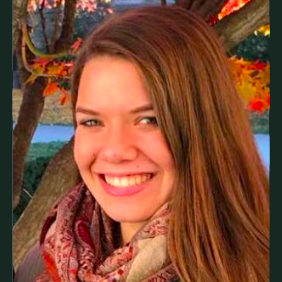by Lauren Clemens
 As a new student of Ukrainian, I began this course with the preconception that it was going to be heavily language and grammar focused with culture on a secondary tier. Prof. Volodymyr Dibrova’s course, Ukrainian for Reading Knowledge, was so much more than just a language course. Covering a wide range of topics from science to culture to globalization, our class has had so much exposure to broad themes and categories from a Ukrainian perspective. Though my Master’s thesis explores political and economic relations between Ukraine and other countries, I understand now the kind of approach I’d like to take when including Ukrainian sources in my thesis.
As a new student of Ukrainian, I began this course with the preconception that it was going to be heavily language and grammar focused with culture on a secondary tier. Prof. Volodymyr Dibrova’s course, Ukrainian for Reading Knowledge, was so much more than just a language course. Covering a wide range of topics from science to culture to globalization, our class has had so much exposure to broad themes and categories from a Ukrainian perspective. Though my Master’s thesis explores political and economic relations between Ukraine and other countries, I understand now the kind of approach I’d like to take when including Ukrainian sources in my thesis.
Perhaps my biggest betrayal to the study of Eastern Europe, I’ve never been a big fan of poetry or literature. Approaching poetry and literature from Ukraine every week seemed like it would be a big challenge for me, and though it was, I found them highly convicting and felt a real sense of pure Ukrainian culture, something I’ve been seeking since I began my thesis work. With the way Ukrainian politics have been volatile for the past thirty years, and especially in the past eight, given the crisis in eastern Ukraine, it seems more urgent than ever that Ukraine finds resolution and the government fulfills their obligations to its citizens. While I tend to take a practical approach to Ukraine, after taking Prof. Dibrova’s course, it’s highly evident that understanding the people, their pain, and their spirit is a key component in doing research on Ukraine.
During our last week of the course dedicated to culture, we read an autobiography on Katerina Bilokur, an incredible painter from the first half of the twentieth century. Her autobiography, though tragic and rather sad, brilliantly illustrates her development as a painter and her relentless desire to create. As if reading her very thoughts, we had the chance to experience her hardship, relationships, and the challenges she faced during her difficult life. She usually created her artwork, most often depictions of flowers and nature, in natural spaces, taking her easel and paints into the fields and woods to paint. She didn’t believe in cutting flowers because it felt like taking a life to her, so she found solace in painting her muses in their own setting. On one hand, I find her writing style to be especially transcendent, transporting the reader into her life and conveying her emotions so much we empathized with her. On the other hand, I sense a reflection of national identity in her life. She wanted to draw and go to school when she was young, but her parents did not allow her, causing their relationship to be rocky well into adulthood. After attempting suicide, she was finally permitted to draw freely, because painting gave her life, and as with the flowers, she didn’t want to take life from anyone. There is something to be said about similarities between her story and Ukraine’s spirit, their fight for freedom and democracy. Though I may simply be weary from the intense weeks, I rather like this analogy and as a student of Ukraine, understanding national heritage and culture is vital in incorporating their voice in my thesis.
Every week we’ve had the opportunity to read Ukrainian poetry, and though I don’t usually understand poetry well, Prof. Dibrova’s explanations have truly helped me understand it a lot better. At the beginning of the course, he explained to us that poetry is an integral part of Ukrainian culture, as Ukrainians begin to read it from a young age, in contrast to Americans, for whom it isn’t so heavily emphasized. Coming from the American school system and not understanding poetry and its importance, I felt hesitant initially at the daunting task of not only understanding a poem, but a poem in a language I’ve just began to study. It was surprising however, to begin to read and pick up on various styles, rhythms, and themes, with much help from Prof. Dibrova. I now find myself more compelled and drawn to Ukrainian poetry, a method of expression during challenging times, in war, in suffering. Given Ukraine’s history, it only makes sense that poetry is such a fundamental part of its culture, and of course, sounds best in Ukrainian; translations simply do not do it justice. Finishing the course with this understanding, I feel more aptly prepared and ready to research and write my thesis with an emphasis on national memory, culture, and heritage as a means of moving forward into a better future.